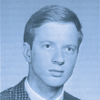Dennis Dahlen – 50th Reunion Essay
Dennis Dahlen
 23 Pond Drive West
23 Pond Drive West
Rhinebeck, NY 12572
BulletPark@aol.com
845-876-5736
Education: Yale BA German Language and Literature 1969, University of Massachusetts BS Electrical and Computer Engineering 1978, Syracuse University MS Computer Engineering 1986
National Service: US Army 69-71
Career: Computer engineer at IBM
Avocations: German and Scandinavian literature
College: Davenport
Majoring in German at Yale and then studying Norwegian at the University of Oslo for a year was certainly not the most efficient way to prepare for a career in engineering at IBM’s mainframe development facilities in New York’s mid-Hudson Valley. I ended up having to supplement my education by getting a couple of technical degrees. But I have no regrets on that point. One of the great things about studying foreign languages is that it exposes you to all kinds of extraordinary works of literature that you might otherwise never even have known existed. In particular:
The Kristin Lavransdatter trilogy and the Olav Audunsson tetralogy by Sigrid Undset (Nobel Prize 1928). Iceland’s Bell and Independent People by Halldor Laxness (Nobel Prize 1955). Die Blendung by Elias Cannetti (Nobel Prize 1981). Niels Lyhne by Jens Peter Jacobsen. Effi Briest, Grete Minde, and Quitt by Theodor Fontane. Der kurze Brief zum langen Abschied by Peter Handke. Stalingrad by Theodor Plievier. Aus dem Leben eines Fauns by Arno Schmidt. Stiller by Max Frisch. I could go on.
(I never did study Icelandic. I read a Norwegian translation of Iceland’s Bell—Islands Klokke—and a German translation of Independent People: Sein Eigener Herr. Stalingrad may not be one of the world’s Great Books, exactly, but just try putting it aside once you’ve gotten a few pages into it.)
Guenther Grass, post–Danzig Trilogy, was a disappointment, for the most part. I struggled through Ein Weites Feld, and what it mainly did for me was to direct my attention to the works of Theodor Fontane. Fontane is said to have regarded his novel Quitt as “interessant, aber nicht gelungen”—in contrast to his novel Unterm Birnbaum, which he regarded as “gelungen, aber uninteressant.” Dead-on, if you want my opinion. In any case, I thoroughly enjoyed Quitt. But I think Grete Minde is probably the best thing Fontane ever wrote.
I didn’t get started working as a computer engineer at IBM until the spring of 1978, but I’ve worked there ever since. I really hadn’t expected it to be so much fun. It’s very rewarding to be part of an enterprise that puts an actual product on the market—especially when that product is so successful. Twenty-five years ago, it was all over the network news that the mainframe computer was about to go extinct. It didn’t happen. The demand for our robust machines—currently known as “IBM System z”—has only grown. (On the other hand, the number of workers it takes to develop and manufacture those machines has plummeted. Forty years ago, there were over 30 thousand IBM employees in the mid-Hudson Valley. At present, we are down to about 5 thousand.)
Still, I’m glad I didn’t rush into it. I think all that language immersion was a smart investment. As Ezra Pound once observed, “Literature is news that stays news.”
If the above is blank, no 50th reunion essay was submitted.
